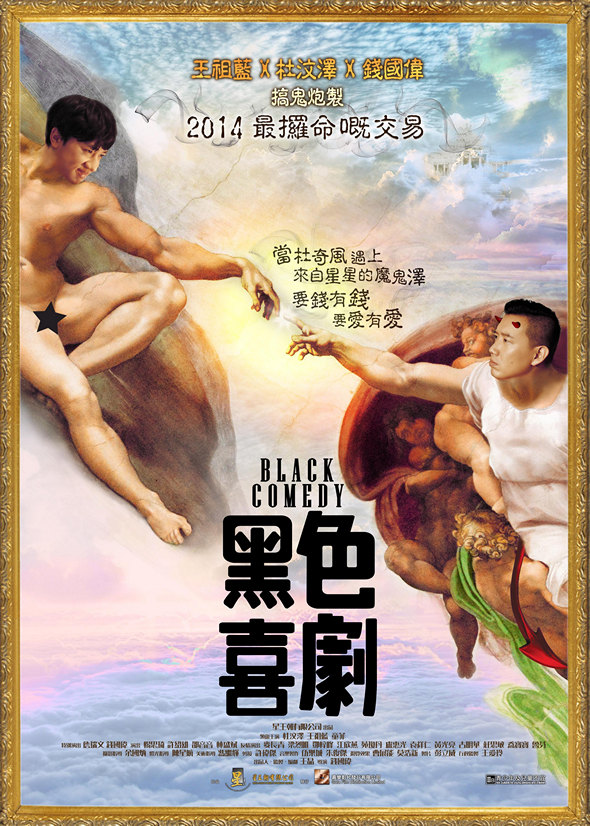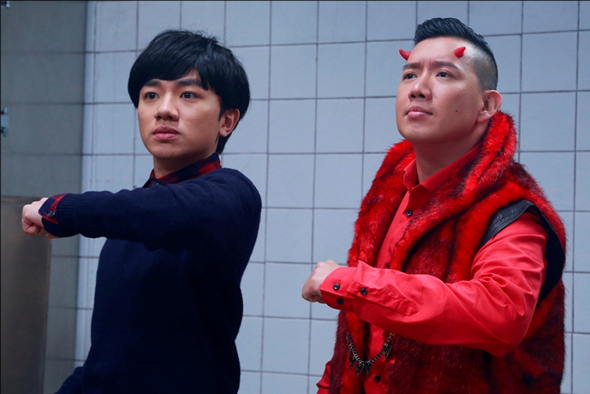
The
Black Comedy (黑色喜劇) is a Hong Kong comedy film released in
2014, which is directed by Wilson Chin and the main characters are Wong
Cho-lam, Chapman To and Kimmy Tong. Its
name and the content of the film are with correlations involving farce and
morbid humor, which is usually deemed to be taboo: angels and evils.
The
film is signaled with cinematic identity as well as bringing Hong Kong audience
personal identification. The film is
produced with Cantonese dialects and with cultural context that helps
reconstructing and reinforcing representation of Hong Kong citizens. The meaning of the film cannot simply interpret as
a story of trading soul with the Devil Prince with 4 wishes. There are some hidden meanings which can
reflect Hong Kong people’s ideology. The
film extrinsically describes Du Kei-Fung (Wong Cho-Lam) as a Hong Kong detective with an unsuccessful career, being
controlled by his girlfriend (Kimmy Tong) and
later traded his soul with the Devil Prince Vincent (Chapman
To),
however, the personal identification can be traced through the 4 wishes made by
Du
Kei-Fung.

In this hustle and bustle life in Hong Kong, people no longer enjoy stable and dull lifestyle like the past but are ambitious in getting better fortune in career, wealth and partner. The film shows the changes in cultural context by using the wishes: getting a hot and loyal girlfriend, be a billionaire and be successful in career, which would be the common goal of people in Hong Kong nowadays. The phenomenon of disappearance of some of the traditional virtues of Hong Kong women is also being indicated within the film.
What is more is that, the Black Comedy is definitely a Hong Kong-oriented production as specific collective memory of Hong Kong can be noticed. It is known that each individual memory of a group is understood only if each memory is located within the thought of the corresponding group. For instance, there are many collective memory that are only understood by Hong Kong audience: rushing home to watch final episode of Soap Drama after work, protest on the street, Andy Lau’s Osim Udivine, irony of NPC Standing Committee’s interpretations of the Basic Law, wish for housing subsidy, etc. The context can help resembling Hong Kong citizens which the context can only be understood by them also.

In addition, a
sense of emotional realism can be achieved by Hong Kong people. The possibility for Du Kei-Fung to have pretty and loyal girlfriend,
plenty of money and ideal career reveal Hong Kong people’s desire of becoming
successful without paying effort nowadays.
Indeed, the film provides an imaginary space for audience’s
identification and emotional release.
To sum
up, the Black Comedy is produced with cinematic identity which is filled with
Hong Kong-oriented issues that can resemble Hong Kong people only. It brought up with the ideology of the Hong
Kong people: to have a successful life in career, wealth and relations
aspects. Moreover, personal
identification can on the one hand be listed out, and on the other hand, the
film recalls the collective memory of Hong Kong audience which resonance would
solely exist in their group. Not to
overlook that emotional realism can also be achieved as it satisfied the wish of
having an ideal life without effort.
(549 words)
Name: Siu Yee Ching, Katy
Student Number: 10517535/21426332
沒有留言:
張貼留言